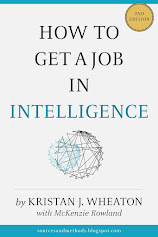According to a recent Wall Street Journal sponsored study (using info from Payscale.com), Intelligence Analysts are happy -- really happy.
Out of the 82 professions examined, intel analyst came in at number 7, scoring a whopping 73.1 out of 100 points. Only one job, Aerospace Engineer, scored 100 of 100 and the other 5 happiest jobs were fairly closely grouped (you can get a general idea of the distribution from the image to the right but for the full interactive glory of this infographic, you have to go to the original WSJ site. In fact, the entire "Paths to Professions" series is worth a look).
This study follows on the heels of the CNN report from last year that indicated that Intel analyst was the 9th best job in the country. CNN did not look at happiness per se so it is hard to compare the two lists but it is interesting to note that, on both lists, intelligence analyst ranks so highly.
I find this particularly interesting given that intelligence analyst does not even have a Bureau of Labor Statistics Standard Occupational Classification System code, which means that the US Government is not tracking the profession in any meaningful way. It suggests to me that intel analyst has become a popular and common enough job to earn the attention of both CNN and the Wall Street Journal but that there are few reliable resources for adequately managing the profession.
(Note: Many thanks to K. for the link!)
Friday, September 24, 2010
Intelligence Analysts Are Insanely Happy (WSJ.com)
Posted by
Kristan J. Wheaton
at
11:54 AM
1 comments
![]()
Labels: intelligence, intelligence analysis, jobs
Thursday, September 23, 2010
Don't Use SWOT Again Until You Have Read This! (Thesis Months)
Popular, yes. Effective? Not so fast.
Mike's survey of over 100 business people with real-world strategic planning responsibilities and experience using SWOT in the workplace paints a very different picture of the value of this technique -- a picture that should have consequences not only for the way it is used but also the way it is taught.
Specifically, Mike found that:
- SWOT adds value only indirectly to the strategic planning process
- SWOT is performed far less often than necessary if it is to achieve even these limited goals (up to four times less often than necessary if I am reading Mike's data correctly).
- SWOT should not be used as a standalone technique under any circumstances
The entire thesis is well worth the read for anyone interested in evaluating analytic methodologies in general or SWOT analysis in particular. Mike collected a number of comments from his survey participants and they serve to ground the statistical data in the complexities of the real world -- to add qualitative gravitas to his quantitative research.
You can view the embedded file below or go here for the download (Note: The file was clearly corrupted when Mike uploaded it to Scribd. All the content is there but some of the pictures and graphs were moved around in weird ways. Hopefully Mike will be able to fix it. In the meantime, the data is still there -- it is just not as "pretty" as it was in the original format.)
Evaluating SWOT's Value In Creating Actionable, Strategic Intelligence You can view the embedded file below or go here for the download (Note: The file was clearly corrupted when Mike uploaded it to Scribd. All the content is there but some of the pictures and graphs were moved around in weird ways. Hopefully Mike will be able to fix it. In the meantime, the data is still there -- it is just not as "pretty" as it was in the original format.)
Posted by
Kristan J. Wheaton
at
12:49 PM
0
comments
![]()
Subscribe to:
Posts (Atom)






